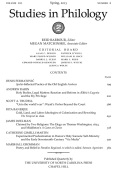
STUDIES IN PHILOLOGY
Scope & Guideline
Fostering Critical Engagement with Language and Literature
Introduction
Aims and Scopes
- Interdisciplinary Literary Analysis:
The journal emphasizes a broad interdisciplinary approach, integrating literary criticism with historical, cultural, and philosophical studies to offer nuanced interpretations of texts. - Focus on Historical Contexts:
A consistent focus on the historical and socio-political contexts of literary works, particularly those from the medieval and early modern periods, allowing for a deeper understanding of their themes and significance. - Exploration of Authorship and Textuality:
The journal investigates questions of authorship, including attribution and the evolution of texts, which contributes to the broader discourse on literary canon and the nature of literary creation. - Thematic Investigations:
Each issue frequently addresses specific themes such as identity, morality, politics, and cultural narratives, providing a comprehensive view of how these elements manifest in literature. - Critical Engagement with Classical and Contemporary Theory:
The journal often employs various theoretical frameworks—from classical literary theory to contemporary post-colonial and gender studies—enabling a multifaceted critique of texts.
Trending and Emerging
- Intertextuality and Adaptation:
There is an increasing interest in intertextuality, examining how texts engage with and respond to one another. This trend highlights the fluidity of literary creation and the interconnectedness of cultural narratives. - Cultural Memory and Historical Trauma:
Themes surrounding cultural memory and historical trauma are gaining traction, as scholars explore how literature reflects and shapes collective memory, particularly in the context of significant historical events. - Gender Studies and Feminist Critique:
A notable rise in gender studies and feminist critiques indicates a growing commitment to exploring the roles and representations of gender in literature, offering fresh insights into traditional texts. - Ecocriticism and Environmental Narratives:
Emerging discussions on ecocriticism reveal an increasing engagement with environmental themes in literature, reflecting contemporary concerns about ecological crises and the human relationship with nature. - Digital Humanities and Textual Analysis:
The integration of digital humanities methods, including computational text analysis and digital archiving, is becoming more prominent, allowing for innovative approaches to understanding literary texts and their contexts.
Declining or Waning
- Traditional Literary Genres:
There appears to be a waning focus on traditional literary genres and forms in favor of more experimental and interdisciplinary approaches. This shift may indicate a broader move towards contemporary relevance rather than classical adherence. - Formalist Criticism:
Formalism, which emphasizes the inherent features of texts such as structure and style, seems to have diminished, as scholars increasingly prioritize contextual and thematic analyses over strict formalist readings. - Localized Historical Narratives:
Interest in localized historical narratives—those focusing on specific regions or minor historical events—has decreased, possibly overshadowed by broader thematic explorations that connect texts to larger cultural and political movements. - Narrow Authorial Studies:
Research concentrating solely on individual authors, particularly lesser-known figures, has declined, with a growing preference for studies that situate authors within broader literary and cultural contexts.
Similar Journals

Studien zur Deutschen Sprache und Literatur-Alman Dili ve Edebiyati Dergisi
Innovating research in the heart of cultural studies.Studien zur Deutschen Sprache und Literatur-Alman Dili ve Edebiyati Dergisi is an esteemed academic journal published by ISTANBUL UNIV, FAC LETTERS, dedicated to the vibrant exploration of German language and literature, alongside critical studies in cultural contexts. Operating with an Open Access model since 2017, the journal facilitates unrestricted dissemination of knowledge, ensuring accessibility for researchers, educators, and students worldwide. Based in Turkey, this journal plays a significant role in the scholarly community, as evidenced by its rankings in Cultural Studies, Linguistics, and Literature and Literary Theory. Although it currently holds a Q4 ranking in Cultural Studies and Linguistics and a Q3 ranking in Literature for the year 2023, it offers invaluable perspectives that contribute to ongoing dialogues in these fields. The journal has established convergence from 2021 to 2024, creating a cohesive platform for the latest research and discussions in German linguistics and literary theory, and invites submissions from scholars aiming to enhance the understanding of the Germanic domain.
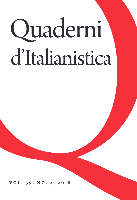
QUADERNI D ITALIANISTICA
Engaging Minds in the Study of Italian LiteratureQUADERNI D ITALIANISTICA is a distinguished journal dedicated to the field of Italian Studies, focusing on literature and literary theory. Published by QUADERNI D ITALIANISTICA and based in Canada, this journal serves as a platform for scholars, researchers, and students alike to engage with critical analyses and scholarly contributions related to Italian literature. Although it has a Q4 ranking in the 2023 category of Literature and Literary Theory and a Scopus rank of #655 out of 982, the journal plays a pivotal role in fostering discourse within this niche. Since its inception in 2002, the journal has contributed significantly to the study of Italian literature, providing a valuable resource for those looking to explore thematic, historical, and narrative aspects of Italian texts. While access to the journal is not offered freely, its comprehensive coverage until 2018 and again in 2020-2021 ensures a rich archive for critical research endeavors. As such, QUADERNI D ITALIANISTICA remains an essential resource for anyone invested in the intricate landscapes of Italian cultural and literary studies.
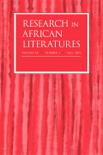
RESEARCH IN AFRICAN LITERATURES
Exploring the Depths of African NarrativesRESEARCH IN AFRICAN LITERATURES is a prestigious peer-reviewed journal published by Indiana University Press, dedicated to the critical exploration of African literary traditions, cultures, and texts. With an ISSN of 0034-5210 and an E-ISSN of 1527-2044, this journal stands out in the field of literature and literary theory, currently ranking in the 80th percentile of its category according to Scopus, making it a significant platform for scholars and researchers alike. Since its establishment, the journal has evolved through converged volumes from 2002 to 2024, consistently fostering innovative discourse and interdisciplinary approaches that illuminate the complexities of African narratives. Although it does not offer open access, the journal is integral for anyone engaged in African studies, providing critical insights that are essential for understanding the broader implications of literature within diverse cultural contexts. The journal's commitment to high standards of scholarship is reflected in its Q3 quartile ranking and its influential contribution to contemporary literary dialogue.

Materiali e Discussioni per l Analisi dei Testi Classici
Unveiling the Richness of Classical AnalysisMateriali e Discussioni per l'Analisi dei Testi Classici is a distinguished academic journal published by Fabrizio Serra Editore that focuses on the rich field of Classics and Literature, serving as a vital platform for scholarly discourse and research. Featuring ISSN 0392-6338 and E-ISSN 1724-1693, this journal has been actively publishing since 2009, with a dedicated effort to analyze classical texts and foster critical discussions among academics and students alike. Although the journal operates without an open access model, it is recognized for its significant contributions, evidenced by its ranking in the third quartile (Q3) in both the Classics and Literature categories as of 2023. This places it among the notable outlets for literary and classical scholarship, with Scopus ranks highlighting its ongoing influence in these fields. Based in the heart of Italy, in Pisa, the journal not only enriches the academic community but also provides an essential resource for those engaged in the profound study of classical literature, inviting contributions that challenge and expand current knowledge and methodologies.
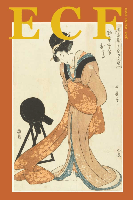
Eighteenth-Century Fiction
Engaging Scholars in the Legacy of Eighteenth-Century FictionEighteenth-Century Fiction is a premier academic journal dedicated to advancing the study of literature from the eighteenth century, publishing innovative research that contributes to understanding the cultural and historical contexts of this dynamic period. Published by University of Toronto Press, Inc., this journal boasts an impressive Q1 categorization in the field of Literature and Literary Theory, reflecting its significant impact on discourse among scholars. Since its inception in 2002, the journal has provided a platform for interdisciplinary exploration and critical analysis, appealing to researchers, professionals, and students alike. With an ongoing commitment to quality and scholarly excellence, Eighteenth-Century Fiction serves as an essential resource for those seeking to delve into the literary innovations and societal transformations of the eighteenth century. Access to its rich collection of articles ensures that the academic community remains engaged with emerging trends and pivotal research in this vital area of study.

LEA-Lingue e Letterature d Oriente e d Occidente
Democratizing Knowledge Through Literary InsightsLEA-Lingue e Letterature d Oriente e d Occidente is an esteemed academic journal published by FIRENZE UNIV PRESS that specializes in the multifaceted exploration of linguistics and literature across Eastern and Western traditions. With its ISSN 1824-4920 and E-ISSN 1824-484X, this Open Access journal has been committed to democratizing knowledge since 2012, allowing researchers, scholars, and students unfettered access to a wealth of scholarly articles and critical studies. Recognized in the Q4 tier for both Linguistics and Language and Literature and Literary Theory in the 2023 category quartiles, LEA strives to bridge cultural and linguistic boundaries while fostering a deeper understanding of literary theory. Operating from its base in Florence, Italy, the journal serves as a vibrant platform for innovative research and discourse, particularly for those dedicated to comparative studies and interdisciplinary approaches in the humanities. Despite its current rankings on Scopus, LEA is poised for growth and aims to enhance its impact in the academic community by publishing cutting-edge research that interrogates linguistic and literary intersections.

Remate de Males
Advancing Linguistic FrontiersRemate de Males is a distinguished academic journal that has been enriching the field of linguistics and language studies since its inception by the UNIV ESTADUAL CAMPINAS, INST ESTUDOS LINGUAGEM in Brazil. With an ISSN of 0103-183X and an E-ISSN of 2316-5758, this journal has embraced the Open Access model since 1980, allowing greater accessibility and dissemination of research findings to a global audience. It plays a crucial role in fostering scholarly dialogue and advancing knowledge in linguistic theory, language acquisition, and related disciplines. The journal welcomes contributions from researchers, professionals, and students, aiming to provide a platform for innovative ideas and discussions that push the boundaries of language studies. By continually prioritizing high-quality peer-reviewed content, Remate de Males remains a vital resource for anyone interested in the complexities of language and communication.
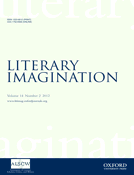
Literary Imagination
Cultivating a Community of Literary ScholarsLiterary Imagination, published by Oxford University Press, is an esteemed journal that delves into the intricate world of literature and literary theory. With the ISSN 1523-9012 and the E-ISSN 1752-6566, this journal serves as a pivotal platform for scholars and practitioners in the field, striving to advance the understanding of imaginative literature from various critical perspectives. Boasting a 2023 rank of #751 out of 1106 in the Arts and Humanities category on Scopus, and categorized in the Q3 quartile for literature and literary theory, the journal is recognized for its contribution to the academic discourse. It aims to foster a vibrant academic community through the publication of innovative research, critical essays, and interdisciplinary studies that engage with the complexities of literary creation from 2009 to 2024. While currently not an open access journal, its rich repository of scholarly work remains accessible to researchers, professionals, and students aiming to enrich their understanding of literary narratives and their theoretical frameworks.
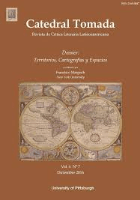
Catedral Tomada-Revista de Critica Literaria Latinoamericana-Journal of Latin American Literary Criticism
Advancing Scholarship in Latin American LiteratureCatedral Tomada - Revista de Crítica Literaria Latinoamericana is a pioneering journal dedicated to the exploration and critique of Latin American literature and its broader cultural implications. Published by the University of Pittsburgh's Library System, this Open Access journal has been instrumental since its launch in 2013 in making scholarly discussions accessible to a wider audience. With an ISSN of 2169-0847, the journal serves as a vital platform for researchers, professionals, and students interested in Literature and Literary Theory, Cultural Studies, and Linguistics and Language. Its esteemed ranking places it in Quartile 1 for Literature and Literary Theory and Quartile 2 for the other categories, underlining its commitment to high-quality academic discourse. Converging insights through a quarterly publication schedule from 2019 to 2024, Catedral Tomada aims to foster a rich dialogue on Latin American literary criticism, encouraging innovative perspectives and diverse voices within the field.
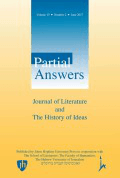
Partial Answers-Journal of Literature and the History of Ideas
Navigating the Complexities of Ideas and TextsPartial Answers - Journal of Literature and the History of Ideas, published by the esteemed Johns Hopkins University Press, is a vital academic resource for scholars interested in the dynamic intersections of literature, philosophy, and cultural studies. With an established track record since its inception in 2003, this journal fosters rigorous dialogue and exploration across disciplines, offering a comprehensive platform for innovative research and critical thought. Highlighted by its 2023 Scopus rankings, it holds positions within the Q2 and Q3 quartiles, indicating a significant impact in its respective fields—specifically in Literature and Literary Theory, and Cultural Studies. Readers can expect cutting-edge articles that challenge conventional wisdom and probe the historical contexts of literary works. Although the journal is not Open Access, it remains committed to the dissemination of scholarly knowledge, making it a cornerstone for researchers, professionals, and students seeking to deepen their understanding of literature's role in shaping ideas. With its diverse contributions and thematic depth, Partial Answers is essential for anyone engaged in the nuanced study of literary narratives and philosophical inquiries.